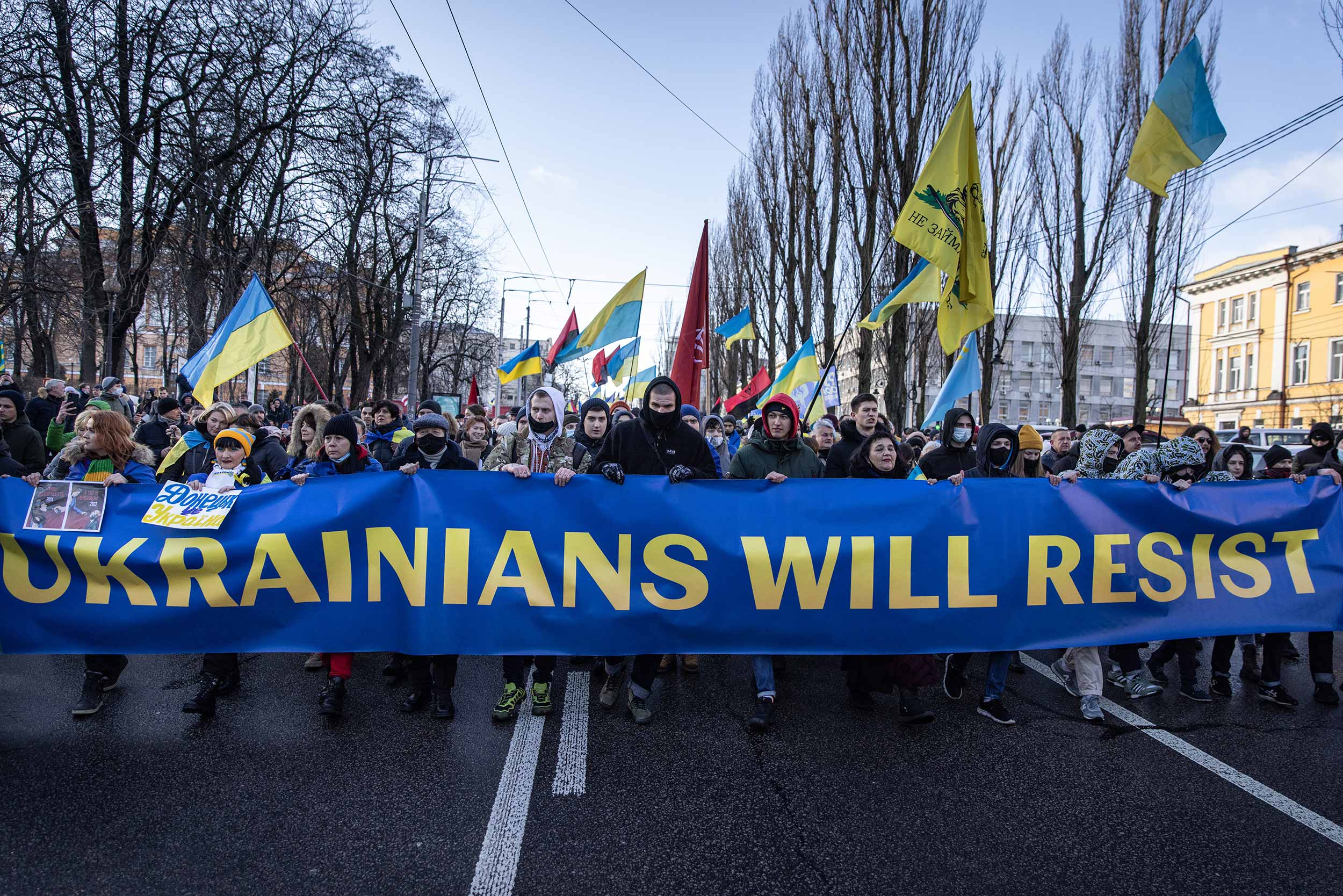Ukraine’s Day of Unity
Government organises public show of solidarity on date rumoured for Russian incursion.
Ukraine’s Day of Unity
Government organises public show of solidarity on date rumoured for Russian incursion.
On February 16, Kyiv journalist Vasily Mikhalchuk went to work wearing a vyshyvanka, the lavishly embroidered shirt key to Ukrainian national dress.
The 27-year-old editor-in-chief of the Typovy Kyiv news website could not attend the rallies planned for the so-called Unity Day – scheduled for the rumoured date of a possible Russian invasion – but said he wanted to show his solidarity in any way possible.
Ukrainians were extremely anxious and needed this show of public cohesion, he said, especially those living near the border with Russia and the parents of soldiers on the front lines.
“Their hearts are broken every day,” Mikhalchuk said. “All Ukrainians now need the authorities’ support. The president's decision to celebrate Unity Day on a possible invasion date is a very cool move. For me, I’m confident that no one will ever break our people.”
Unity Day, announced by President Volodymyr Zelensky in a February 14 televised address, was just the latest in a series of public events highlighting national defiance and the threats the country faces from Russia.

Huge numbers of Russian troops have continued to mass on the border with Ukraine, although Moscow denies accusations that it is intending to invade.
In a grassroots protest on February 12, hundreds of Kyiv residents rallied near the main building of the Taras Shevchenko university to draw attention to the threat from Russia. Many held placards reading Say NO to Putin, Ukrainians Will Resist and Donetsk is Ukraine.
“Against the backdrop of the escalation of Russia’s military aggression against Ukraine, it’s very important to unite citizens around the positive,” said Angelina Strashkulich, a 23-year-old journalism student, noting that many people had used Unity Day to wear national dress and hang Ukrainian flags from their houses and cars.
Small rallies were held in regional centres and across the country, schoolchildren sang the national anthem at 10 am. A social media flashmob was launched under the hashtag #яЗалишаюсьвУкраїні і #UAразом (unity marathon), and foreign diplomats also aired their support online.
In Kyiv, 200-metre Ukrainian flag was unfurled at the Olympic stadium in Kyiv.
“This initiative has also increased attention of Ukraine's international partners,” Strashkulich continued. “For example, on February 16, Lithuania celebrates Independence Day, but a delegation from their Seimas [parliament] visited the Ukrainian parliament to demonstrate their support and unity with Ukraine.”
The previous day, on February 15, the Russian parliament voted to appeal to President Vladimir Putin to recognise the independence of the self-declared Donestk and Luhansk republics.
Yegor Chernev, a deputy from the ruling Servant of the People party, said that this could mark a worrying new escalation.
“Russia is looking for new moves and tools to influence Ukraine. They failed to force the West to end the dialogue on our entry into NATO. Then they tried to squeeze in the Minsk agreements in the wording they needed, and also failed. Now they put forward recognition of the LDNR [self-proclaimed Luhansk and Donetsk republics] as a move.”
The 36-year-old, also a member of the Ukraine-NATO inter-parliamentary council, said he believed that Russia might recognise the breakaway republics. This could lead to a massive influx of arms and then an offensive under the pretext of liberating the Donetsk and Luhansk regions as a whole.
Alternatively, he continued, the Duma deputies’ appeal could simply be another element of the information war, demonstrating that the Russians still have a variety of options.
“I'm leaning towards the second option. After all, the appeal was adopted on the eve of the meeting between [German chancellor Olaf] Scholz and Putin,” Chernev said. “He is trying to convince everyone that he is serious and will go to the end by any means.”
This publication was prepared under the "Amplify, Verify, Engage (AVE) Project" implemented with the financial support of the Ministry of Foreign Affairs, Norway.
